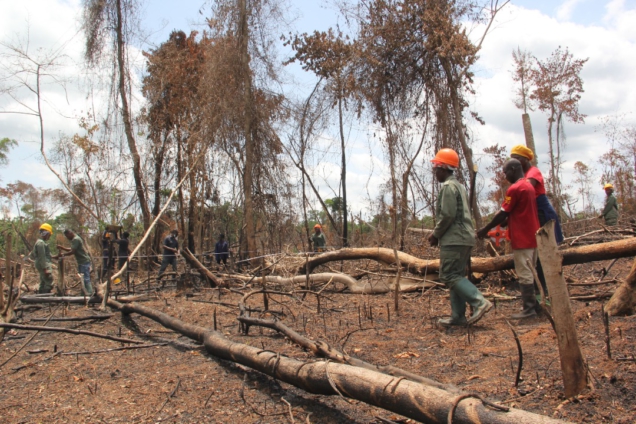
Audio By Carbonatix
The impact of global warming is costing African nations up to 5% of their economic output, the United Nations climate chief said on Thursday, calling for more investments to help adapt to climate change.
The 54-nation continent, which has borne the brunt of climate change despite releasing far less polluting emissions than the industrialised world, receives just 1% of annual global climate finance.
"The climate crisis is an economic sinkhole, sucking the momentum out of economic growth," Simon Stiell, executive secretary of the U.N. Framework Convention on Climate Change (UNFCCC), told a meeting of African ministers of environment in Abidjan, Ivory Coast.
African governments and their climate negotiators are considering various strategies at the pre-COP29, or Conference of the Parties, preparatory meeting in the West African country.
Although the continent has attracted new investors in climate mitigation and adaptation projects in recent years, it gets a very small portion of the $100 billion in financing available globally, African government officials say.
That is a drop in the ocean of the $1.3 trillion required, the officials say, without providing a time frame for by when the amount would be needed.
"Africa's vast potential to drive forward climate solutions is being thwarted by an epidemic of underinvestment," Stiell said.
The required investments include $4 billion annually to eliminate the use of traditional fuel for cooking on the continent, such as wood, which contributes to greenhouse gas emissions, Stiell said.
"Of the more than $400 billion spent on clean energy last year, only $2.6 billion went to African nations," he said.
Climate change has been blamed for protracted drought and bouts of catastrophic flooding across Africa that have hit food production, driving up commodity prices and worsening hunger.
Stiell said there have been growing calls for Africa to secure more climate financing in the run-up to COP29 in Baku, where nations will be looking for consensus on new international climate finance goals.
"We must use innovative financing solutions for adaptation without exacerbating debt burdens," Hanan Morsy, chief economist at the United Nations Economic Commission for Africa (UNECA), told a climate finance conference last week.
Such innovations include debt refinancing and swaps as well as carbon markets, she said.
Latest Stories
-
Jospong Group partners Ghanaian scholars in diaspora to drive national development
2 minutes -
Newsfile to discuss over $214m loss in Gold-for-Reserves and galamsey fight under Mahama
5 minutes -
The Silence of the doer: Why strategic storytelling is the soul of governance
9 minutes -
Police nabs 3 drug suspects in Tamale
35 minutes -
The surprising benefits of a glass of orange juice
35 minutes -
31 remanded over invasion of Apamprama Forest Reserve
43 minutes -
One year of President Mahama: Leadership that rebuilt trust – Dr Callistus Mahama writes
60 minutes -
Anthony Joshua’s driver charged over Nigeria crash that killed two
1 hour -
Joseph Ayinga-Walter: Ode to Melita Happy Kutorkor Antiaye
1 hour -
Christians usher in 2026 with prayers, declarations and renewed hope
1 hour -
Ahmed Ibrahim rallies traditional, religious leaders support for peace building
1 hour -
Bus returning from 31st night prayer kills 2, injures dozens at Assin Dansame
2 hours -
Political parties must stay out of local governance – Andrew Bediako
2 hours -
Beyond Witchcraft: Why preparation, not spiritual fear, determines success
2 hours -
Margaret Korme Tetteh
2 hours

